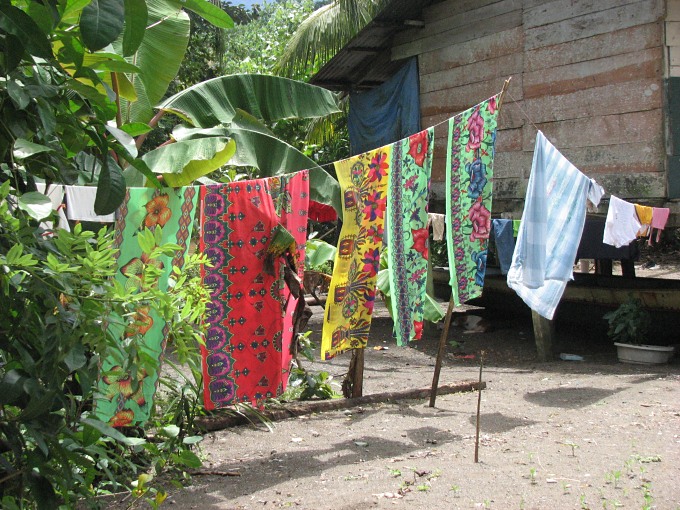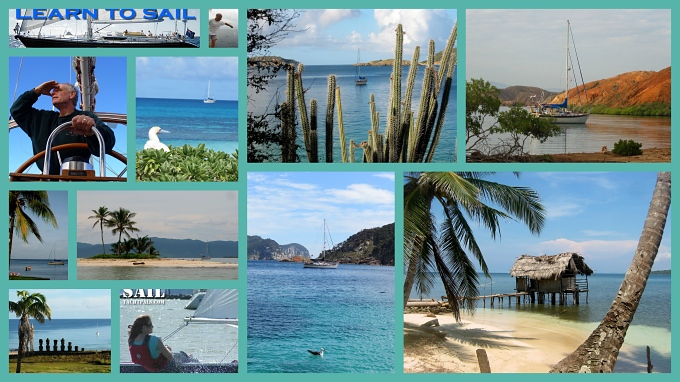FAQ - How do you do laundry aboard?
/
Dirty laundry is one of those things that just never goes away. On land or sea, it's always there and there's always more. You can let it pile up and then it adds a distinctive odor to the already present diesel and bilge smells aboard. Or you can try to keep up with it on a regular basis. Either way, it's one of those things you have to deal with … eventually.
Some boats have washing machines aboard. Nine of Cups is not one of them. When we're in a marina or in a town with a laundromat close by, it's pretty easy. You tote the dirty laundry in, do the wash/dry routine and you're good to go … until the next time. I prefer to wash and dry aboard when I can. We string a clothesline between the forward shrouds and the staysail furler which makes a triangle and a reasonable amount of hanging space. I use the lifelines as extra space if I need it. Wire lifelines sometimes leave rust stains. We have Dyneema lifelines which are non-metal, so rust is not an issue. Many marinas do not allow you to hang laundry aboard and when that's the case, I either use the marina's dryer or in some cases, the marina's communal clotheslines. The clothes smell better when they're air-dried; it's a “green” thing to do; it's easier on the fabrics; and of course, it saves money.
Laundromat fees can be very expensive, up to $12/wash-dry a load. That adds up quickly when you've got several large loads to do. Instead, I try to hand wash most things regularly. Underwear, socks, t-shirts are pretty easy. I put water and a small amount of laundry detergent in a pail and dump in the dirty laundry and let it soak overnight. I mix it around a bit … this is the “agitation” cycle. In the morning, I give special treatment and a scrub to problem areas, then I wring out and rinse in a pail of fresh water, wring out again and hang everything out to dry. A good windy day and everything's dry in a couple of hours.
Jeans, sheets and towels are a bit more unwieldy and heavy to handle. Jeans are a problem because they're heavy and tend to try to escape while on the line in a stiff breeze. We string small stuff (short lengths of line) through the belt loops and tie them to the clothesline to insure they stay put. Sheets are more easily washed in the dinghy or in the river if you can manage it. Wringing out sheets is more easily done as a joint effort. One person on each end and twist, twist, twist.
If you have a watermaker, water is not a problem. We do have a watermaker, but I hate using fresh water from the tank if I don't need to. It takes energy to run the watermaker. We collect rainwater in buckets and use it whenever possible. We've also traveled up river at times to collect water for laundry. If the dinghy is tied to Cups' side during a rain shower, it's the perfect water collector. You can even do the laundry in the dinghy if you're stuck with doing sheets and no laundromat in sight in the near future.
I've done laundry in rivers along side local women. It's a chance to compare notes and an excellent example of “though we're different, we're more the same”.
A couple of tricks …
- David has tied knots in the clothesline about every 18”. This keeps the clothespins (clothes pegs) from sliding along the line as the clothes sway in the breeze.
- We use carabiners tied to the end of a pre-measured clothesline so that I can just clip the clothesline onto a shroud, wrap it once around the staysail furler and around the opposite shroud and clip on with another carabiner to the original shroud. It's quick and convenient.
- I made a ditty bag that holds the clothesline and extra clothespins. I leave the clothespins on the line when it's stored so it's quick to take down and really convenient when I string it up again.
- I pre-treat with liquid detergent any spots that are apparent as soon as I can and they usually come out easily with just a light scrub in the “agitation” cycle.
Do you have any ideas or suggestions for doing laundry aboard? We'd love to hear them and share them.
This is the "pink" view of doing laundry. Check tomorrow's blog for a chuckle and the Blue View!
| Days and Ways to Celebrate |
| A daily list of mostly obscure holidays and fun ways to celebrate them. |
| World Water Day |
| A UN sponsored event which advocates the necessity for proper management and conservation of fresh water throughout the world. Try shutting off the water when you're brushing your teeth. Conserve. |








 and all those
and all those  had him joining the Navy at age 18 … to see the world. He ended up working in electronics Stateside and never went to sea. In fact, he was never on a ship in his entire naval career.
had him joining the Navy at age 18 … to see the world. He ended up working in electronics Stateside and never went to sea. In fact, he was never on a ship in his entire naval career.
